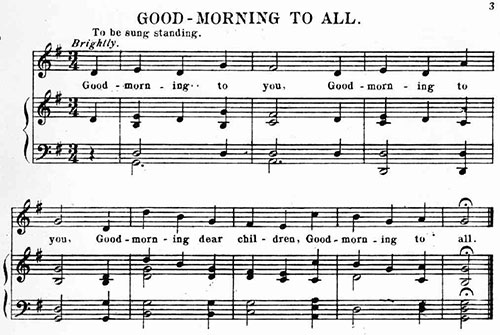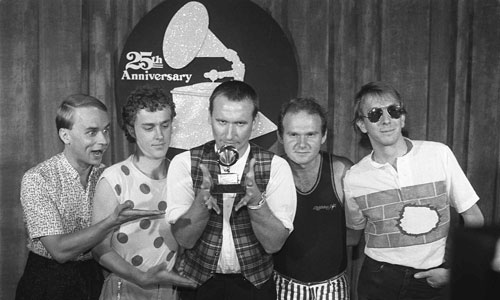Worst. Birthday. Ever.
The traditional song "Happy Birthday" is definitive proof that just because a song is traditional doesn't mean it isn't copyrighted.

"Happy Birthday": The evolution from classroom to courtroom
If nothing else, the tale of "Happy Birthday" highlights the memetic nature of traditional music.
The tune, which got its start in 1893, as the schooltime ditty "Good Morning to All." The song, written by sisters Patty and Mildred Hill, was written specifically to be easy to sing for young children—which makes sense, as Patty was a teacher. But the melody proved more successful than the lyrics, and by 1911, the song began its long morph from children's song to birthday ditty, after it was first published in the public domain book The Elementary Worker and His Work.
Today, we'd call this a mashup. But a funny thing happened on the way to obscurity for the Hill sisters—a Broadway play called As Thousands Cheer, complete with music written by Irving Berlin. Patty didn't really want anything to do with the lawsuit, but her sister Jessica pushed forward, pointing out that "Happy Birthday" had many similarities to the original tune.
In 1935, in the wake of a successful settlement, the Hills and the "Good Morning" copyright owner, Clayton F. Summy, officially copyrighted the birthday ditty.
Since then, "Happy Birthday" has generally been off limits to film-makers and greeting card makers unless they want to pay a fee, one that ranges in the hundreds to thousands of dollars. In the 1980s, when Summy's company still directly owned the song, the company still hunted down unauthorized uses—such as when members of Congress sang the tune for President Reagan.
The birthday shakedown
Today, the tune is owned by Warner/Chappell Music, and it's now up for a little bit of legal debate—thanks to a documentary filmmaker who simply wanted to create a film about a song everyone knows.
“Before I began my filmmaking career,” Jennifer Nelson told The New York Times. “I never thought the song was owned by anyone. I thought it belonged to everyone.”
Nelson, who was working on the film Happy Birthday when Warner/Chappell tapped her on the shoulder and asked her to pay up, has been leading a crusade to get the song out of copyright, arguing that there's evidence that the song predates the 1935 copyright. The lawsuit, which has been ongoing since 2013, is currently in front of a U.S. District Court judge.
"The fact that parties other than the Hill Sisters disseminated the lyrics to Happy Birthday to You prior to the 1935 registration does not displace the copyright that Warner/Chappell now owns," lawyers for Warner/Chappell argued in a legal briefing last week.
It's unclear how the judge is going to eventually decide, but a lot of people have opinions on how they should.
$5k
Five traditional songs that aren't actually in the public domain
- A bunch of Christmas songs aren't in the public domain—somewhat surprising as they've become so common—but the most surprising of the bunch is "Little Drummer Boy," which (much like "Happy Birthday") was borne from a classroom.
- "If You're Happy and You Know It," cease and desist. The hand-clapping children's song has roots in traditional Russian music, but it was copyrighted in the 1970s by a Sesame Street songwriter, meaning that when a 12-year-old girl downloaded it on Kazaa in 2003, she was targeted by the Recording Industry Association of America.
- Know the fast-break song that plays at every sporting event ever? The organ-spouting "da da da da da da … CHARGE" ditty? Apparently, it's not only copyrighted, but there's a debate over who owns the copyright. It's either the estates of late USC musical maestros Dick Winslow and Tommy Walker or onetime San Diego Chargers music man Bobby Kent.
- Speaking of songs with multiple copyright claimants, the "Hokey Pokey" has an extremely convoluted existence, with multiple musicians making claim to the song over the last 80 years.
- Here's a halfsie: Woody Guthrie's classic "This Land is Your Land" is under copyright, but only for variations created after 1956. Why's that? Well, that's when the song was copyrighted. Problem is, the song was created in 1945, and that's the version JibJab parodied around the time of the 2004 election. When the copyright holder sued, they found out the hard way that the original version of Guthrie's song had fallen out of copyright in 1973. Oops.

Why Men At Work got sued for their most popular song
Because this is a copyright case, there's always prior art. And there's actually something of a precedent for this whole issue in Australia.
The 1983 Men at Work hit "Down Under" came at a point of peak commercial appeal for all things Australian within the United States,and the tune set the stage for the popularity of Aussie kitsch worldwide—and in Australia itself, it became something of an unofficial slogan.
Unfortunately, another song of iconic relevance to the country, the children's tune "Kookaburra Sits in the Old Gum Tree," came back to haunt the band nearly three decades later. The problem? In 2008, a quiz show pointed out that the flute solo in Men At Work's tune took inspiration from the children's tune, which was first written in the 1930s by schoolteacher Marion Sinclair.
Despite "Down Under" coming out nearly 30 years before the quiz show highlighted this fact, and the fact that Sinclair had died in 1988, the current owners of the tune, Larrikin Records, decided to sue the band over the tune. (Compare and contrast the two tunes here.) The lawsuit ultimately went in Larrikin's favor, though their ask, for 50 percent of the profits of the song retroactive to the song's creation, was whittled down to a mere 5 percent and all profits from the song dating back to 2002.
The lawsuit, which was widely criticized by both native Australians and copyright advocates worldwide, had a particularly harsh effect on Greg Ham, the man who played the flute solo that caused the problem in the first place.
"I'm terribly disappointed that that's the way I'm going to be remembered—for copying something, '' Ham said of the lawsuit in 2010. ''It will be the way the song is remembered and I hate that."
Ham's life soon spiraled out of control after the lawsuit, with his once-in-check heroin addiction returning full force, his marriage crumbling, and his mansion forced to go onto the market. In 2012, he was found dead in his home due to a heart attack.
"The whole case had undone him," a friend told The Sydney Morning Herald.
In the end, the song's co-writer, Colin Hay, ended up recording new versions of the song later in 2012 in honor of its 30th birthday, with the song and the lyrics largely the same—other than a rewritten new flute solo.
"The power and strength of the song lies in its original words and music. It speaks for itself," Hay said of the new versions to the Herald—as he noted how much he missed Ham.
So, if this birthday lawsuit goes south, should we get a new song to replace it? Fortunately, the community-owned radio station WFMU has been focused on this issue for years now, and in 2013 held a contest asking for public domain alternatives to "Happy Birthday."
If they need any help with ideas, they know exactly where to look—the entertainment industry, which for decades has tried to write around the issue. In 2009, the Nickelodeon series iCarly even made a cheeky reference to this point.
But why does it have to be this way? It's such a stupid issue, and it doesn't even make that much money in the grand scale of things; just $2 million per year, a rounding error for Time Warner.
It's not even having one's cake and eating it too; there's barely even any cake.
:format(jpeg)/2018/04/gnqa9tmhbd7w7yu0ygsp--1-.gif)
/2018/04/gnqa9tmhbd7w7yu0ygsp--1-.gif)

/uploads/ernie_crop.jpg)